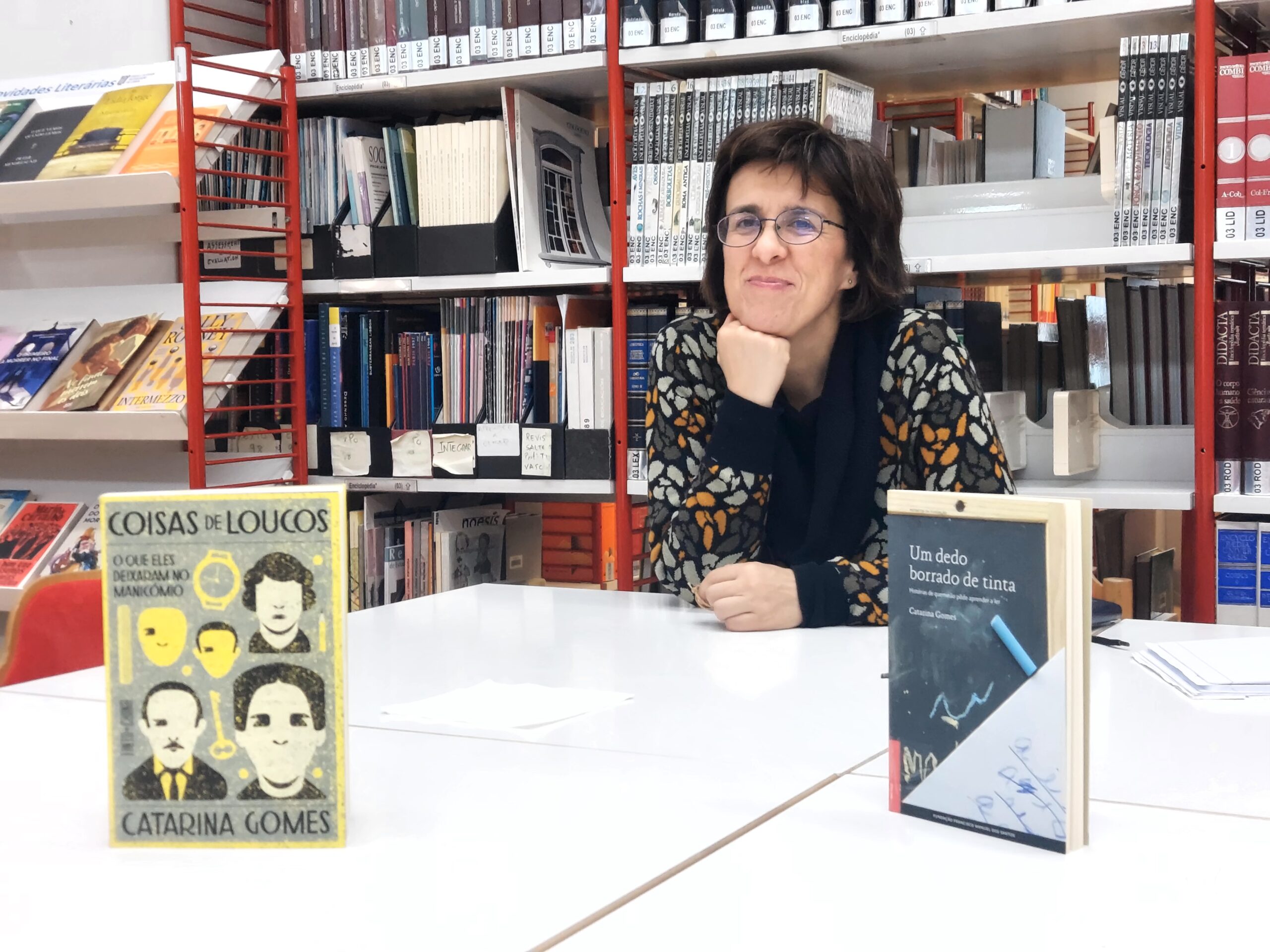“Enough with the notes”: Catarina Gomes and literature as a way of honoring stories and people
On March 27, Catarina Gomes was the guest writer at the Entrelinhas Reading Club, at the School of Communication and Media Studies (ESCS), organized in partnership with the LEReduca Reading Club, at the Lisbon School of Education (ESELx), where the meeting was held.
Catarina Gomes is a journalist and writer with an optimistic view of reading and sees social networks as a possible ally. She likes to take her time to write and is fascinated by mental health issues.
This session of the reading club, which had 14 participants, most of them watching online, was led by Antónia Estrela, professor at ESELx and director of IPL’s Language and Culture Center (CLiC).
A poetic thriller
One of the books that inspired the conversation was Coisas de Loucos – O que eles deixaram no manicómio, published by Tinta-da-china.
In this book, Catarina Gomes starting point is the discovery of a box of objects belonging to former patients of Portugal’s first psychiatric hospital, Miguel Bombarda, leading her to “rescue from oblivion the lives of patients who were confined there for decades”, reads the synopsis.
It took the author eight years to write the book, a “poetic thriller”, as she describes it. She did it in her spare time, while she was a journalist at Público. She wanted to write without rushing and enjoy the process. If a response took six months to arrive (as it did), she wanted to respect those timings.
As for the choice of topic, the writer explains that she has always been attracted to mental health issues, adding that this attraction arises “out of fear”. While working on the research for this book, she thought: “Let me see how they got crazy, to see if it doesn’t happen to me”.
“We’re all so close to this,” the writer comments, referring to the risk of losing our mental health. It’s “almost arrogant” to look from a distance, she adds.
When asked by one of the session’s participants whether there should be historical reparations “for the people who were imprisoned, sick and not sick”, the guest author shares that, for her, it is complicated to use today’s lenses to evaluate historical circumstances in which treatments were not guided by current practices and in which professionals probably did the best they knew.
Nevertheless, with regard to the case of Valentim de Barros, a talented Portuguese dancer who was in the asylum for almost four decades because he was homosexual, Catarina Gomes recalled that the very day after the reading club session, a Studio Room named after Valentim de Barros would be inaugurated at Largo Residências, a cultural cooperative located in the Bombarda Gardens. The Valentim tribute program also included a series of concerts dedicated to the dancer.
For the writer, “honoring stories is a form of historical reparation”.
“I wanted to get closer to people without belittling them”
The second book selected to inspire this Book Club session was Um dedo borrado de tinta, Histórias de quem não pôde aprender a ler, from the collection “Retratos” of Francisco Manuel dos Santos Foundation.
In this book, Catarina Gomes portrays the daily lives of the inhabitants of a Portuguese village who didn’t have the opportunity to learn to read and write. These stories “are almost social archaeology, testimonies of a world on the verge of disappearing”, reads the book.
“What is it like to live without knowing how to read or write?” wondered the author, thinking of her own grandmothers. This was also the “long phrase” the writer used when approaching people in Casteleiro, a parish in the Guarda district, to avoid expressions like “illiteracy”.
“I wanted to get closer to people without belittling them,” says the writer. Catarina Gomes was not always able to get the answer she was looking for. In some cases, people preferred to talk about the achievements in their lives rather than getting stuck on the “detail” of not knowing how to read or write; in other cases, they did not want to expose themselves. “Enough with the notes,” a lady told her, asking her to leave the house.
The comment, which Catarina did not find strange, ends up being related to a concern of the writer in her writing process: it is necessary to tell these stories ensuring that the dignity of the people portrayed is not undermined.
Once again, literature as a way of honoring stories and lives.
“Social media can be friends of reading”
During the session, current reading habits were also discussed.
The guest has “an optimistic view of reading”. She points out that Instagram “is full of instagrammers with a passion” for reading, ebooks and audiobooks are also making their way, book podcasts are proliferating and “there are book clubs everywhere”.
Perhaps the relationship with books and reading among young people today is not the same, the way of sharing is very different. Now, it’s through digital platforms, and in this sense “social media can be friends of reading”, believes the writer, who says she receives a lot of messages and comments about her books.
As for the future, the writer is working on her next book, which will be about her father, who died at the age of 47. With no publication date yet, Catarina Gomes shares that, so far, this is “the most autobiographical and painful of her books”.
Finally, challenged to comment on some of the books recently acquired by the ESELx library, Catarina Gomes selected Forbidden notebook, by Alba de Céspedes; The country of others, by Leila Slimani; Filho da mãe, by Hugo Gonçalves; and Eliete, by Dulce Maria Cardoso. All of them are stories of profound humanity that can make us “more empathetic”.

